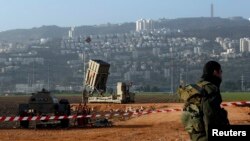JERUSALEM —
Israeli Air Force planes reportedly struck a target in southern Syria near the border with Lebanon early Wednesday.
Quoting security sources, international wire services reported that Israeli aircraft attacked a convoy after an unusually high level of activity in nearby Lebanese airspace.
Israeli officials offered no comment. But the report comes amid rising concern in Israel that in the upheaval from Syria's civil war, Syria’s chemical weapons’ arsenal is vulnerable.
Israeli officials have been warning for days that as the Syrian government loses control of more territory, the risk is rising that some of its chemical and biological weapons could fall into the hands of militant anti-Israel groups.
Israeli officials say they are prepared to intervene militarily to prevent any transfer of chemical weapons from the Syrian stockpiles.
The head of the Israeli Air Force, Major-General Amir Eshel, said Syria is in the process of disintegrating and Israeli authorities are taking action on a daily basis in what he called an ongoing struggle to reduce the immediate threats of Syria's weapons falling into dangerous hands.
Eshel’s remarks to a security conference in Tel Aviv this week followed the deployment of two batteries of the Israeli anti-missile defense system, called Iron Dome, to northern Israel.
The Israeli military has also been holding exercises in the north.
Israeli fears
The head of diplomatic security in Israel's Defense Ministry, Amos Gilad, told Israel’s Channel One television that Syrian government control of chemical weapons and a huge quantity of poisonous gas could change at any time.
The Syrian government has been battling rebels of the Free Syrian Army for nearly two years. The rebels have been joined by foreign Islamist fighters, some of whom are said to be affiliated with the al-Qaida terrorist group.
The former head of intelligence for Israel's Mossad security agency, Amnon Sofin, told reporters Wednesday that the Islamist fighters, sometimes called Salafists, do not have missiles and need firepower.
The greatest concern for Israel, he said, is that chemical weapons could come under the control of Lebanon's Hezbollah movement.
Israeli officials believe Hezbollah, which has sworn to destroy the Jewish state, has tens of thousands of rockets and missiles aimed at Israel from sites in southern Lebanon.
"Hezbollah, they possess first of all the launchers and the missiles and they can mount the chemical warheads on the missiles, something that the Salafists in Syria don't have so far," Sofin said.
Israeli Vice Premier Silvan Shalom told reporters the situation is endangering stability in the Middle East.
"It means that chemical weapons, if it [they] move into the hands of the extremists and the terrorists, will change dramatically the balance of power in the Middle East," he said. "It is something that I believe most of the world cannot tolerate."
Quoting security sources, international wire services reported that Israeli aircraft attacked a convoy after an unusually high level of activity in nearby Lebanese airspace.
Israeli officials offered no comment. But the report comes amid rising concern in Israel that in the upheaval from Syria's civil war, Syria’s chemical weapons’ arsenal is vulnerable.
Israeli officials have been warning for days that as the Syrian government loses control of more territory, the risk is rising that some of its chemical and biological weapons could fall into the hands of militant anti-Israel groups.
Israeli officials say they are prepared to intervene militarily to prevent any transfer of chemical weapons from the Syrian stockpiles.
The head of the Israeli Air Force, Major-General Amir Eshel, said Syria is in the process of disintegrating and Israeli authorities are taking action on a daily basis in what he called an ongoing struggle to reduce the immediate threats of Syria's weapons falling into dangerous hands.
Eshel’s remarks to a security conference in Tel Aviv this week followed the deployment of two batteries of the Israeli anti-missile defense system, called Iron Dome, to northern Israel.
The Israeli military has also been holding exercises in the north.
Israeli fears
The head of diplomatic security in Israel's Defense Ministry, Amos Gilad, told Israel’s Channel One television that Syrian government control of chemical weapons and a huge quantity of poisonous gas could change at any time.
The Syrian government has been battling rebels of the Free Syrian Army for nearly two years. The rebels have been joined by foreign Islamist fighters, some of whom are said to be affiliated with the al-Qaida terrorist group.
The former head of intelligence for Israel's Mossad security agency, Amnon Sofin, told reporters Wednesday that the Islamist fighters, sometimes called Salafists, do not have missiles and need firepower.
The greatest concern for Israel, he said, is that chemical weapons could come under the control of Lebanon's Hezbollah movement.
Israeli officials believe Hezbollah, which has sworn to destroy the Jewish state, has tens of thousands of rockets and missiles aimed at Israel from sites in southern Lebanon.
"Hezbollah, they possess first of all the launchers and the missiles and they can mount the chemical warheads on the missiles, something that the Salafists in Syria don't have so far," Sofin said.
Israeli Vice Premier Silvan Shalom told reporters the situation is endangering stability in the Middle East.
"It means that chemical weapons, if it [they] move into the hands of the extremists and the terrorists, will change dramatically the balance of power in the Middle East," he said. "It is something that I believe most of the world cannot tolerate."




